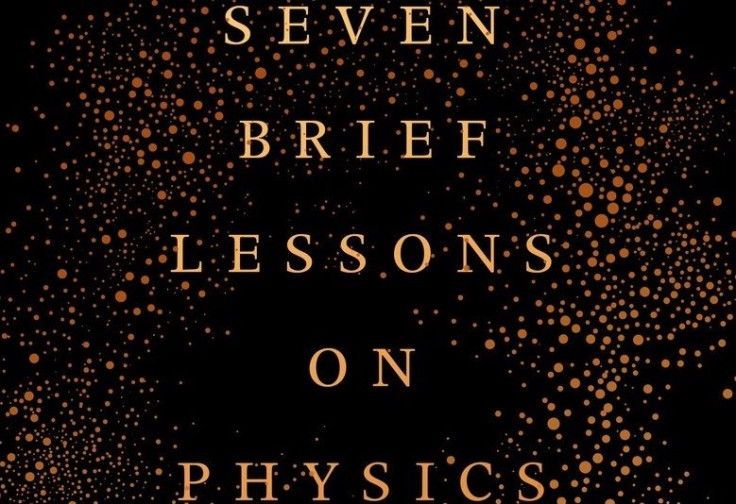Carlo Rovelli, ‘Seven Brief Lessons On Physics’ Author, On Love And Beauty In Science

Science in 2016 very much resembles the spirit of the 1960s, according to Carlo Rovelli. The theoretical physicist is now a New York Times bestselling author for his recently released “Seven Brief Lessons on Physics.” The book, at just under 100 pages, covers the heady topics of general relativity and a new way of thinking about time in terms of heat and probability.
There's a renewed curiosity and a public awakening to the beauty at the heart of science, Rovelli, 59, said in an interview with International Business Times.
Rovelli did not find his calling until he was older. He recalls how many of his colleagues were enamored with science since childhood, but Rovelli studied philosophy, Latin and Greek art and literature. But then he found science. After realizing that science could lead to a happier, gentler world, Rovelli didn’t want to just work at a bank.
“When I was 24 or 25 studying for exams, I realized how beautiful modern theoretical physics was. It was a love affair. It was fantastic,” he said.
“Seven Brief Lessons on Physics” is an account of that discovery, which led him to a career as a theoretical physicist researching quantum gravity. Rovelli is now working on the difficult problem of resolving the two main strands of modern physics. On the one hand, there's general relativity, which explains gravity. Quantum mechanics, which covers all the fundamental particles, explains the fundamental forces such as the strong force, weak force and electromagnetic force. But researchers have not found a unified way to explain both the forces and gravity.
Quantum gravity is just one of the many mysteries presented to scientists by the universe. Luckily, scientists working in 2016 are experiencing a sort of renaissance when it comes to public curiosity. “It’s a good moment for science. It’s also a bit of a coming out from a period in which science was under attack and there was stronger criticism,” Rovelli said. “It’s, sort of, coming back to the spirit of the ‘60s when everybody was fascinated with — and loved — science, and men walked on the moon. There’s increasing attention, increasing curiosity, and the public is realizing how beautiful science is and wants to learn more.”
Rovelli describes recent discoveries regarding water on Mars or gravitational waves as “spectacular.”
“Nobody believed the theory of general relativity all the way through. Nobody was so sure of the standard model all the way through. A lot of the things that have come out have been nature’s way of saying ‘Yes, you are on the right track.’”
That's not to say these confirmations are not exciting. Gravitational waves will provide a way to “hear” the universe. Even though Rovelli, and many others in the scientific community, expected the LIGO experiment to find these gravitational ripples in spacetime, thus confirming the last piece of Albert Einstein's theory of general relativity, the results were still surprising.
“I think the big surprise was not so much with the waves themselves, but I did not expect such a clean, beautiful picture of two black holes merging,” Rovelli said. “They were able to determine the mass of the two black holes, the mass of the singular black hole from this great, catastrophic event. Or, maybe, a better way of putting it would be the making love of two black holes in the universe.”
With the finding of gravitational waves in 2016 following the discovery of water on Mars and the first views of Pluto in 2015, the picture of the universe is getting clearer, but there are large mysteries yet to be answered. Normal matter — everything we can see — makes up just five percent of the universe. The rest is divided between dark energy, around 68 percent, and dark matter, roughly 27 percent. “There are huge mysteries in front of us, and I think the scientific community is optimistic to understand something in the next few years. We are going to be surprised because the universe is going to change in front of us.” Rovelli said.
In a world where the public is interested in science, Rovelli is a great ambassador whose passion can be found in “Seven Brief Lessons on Physics.” The book came about by chance. After he wrote a series of articles for an Italian newspaper, his girlfriend presented him with a challenge to write about quantum gravity in a way that everyone could understand and enjoy. “I said, ‘Come on!’ There’s no way you could squeeze quantum gravity into an article. Nobody’s going to understand it.” That led to a series of short articles covering general relativity, quantum mechanics and then quantum gravity.
After some initial resistance to writing a book, Rovelli soon had enough material for two short novels. Keeping it minimal was important, which led to the 96-page “Seven Brief Lessons on Physics.” Even though the book is an exploration of scientific thought, it's very much about humanity, according to Rovelli. Any discussion about the universe leads to a question of whether or not we are alone in the universe. That's nonsense to Rovelli. “To me, it’s just screaming that we’re a part of nature. We shouldn’t think of ourselves as separate and belonging to a different realm. And that’s great, because we’re home in nature and this universe,” Rovelli said.
© Copyright IBTimes 2024. All rights reserved.





















